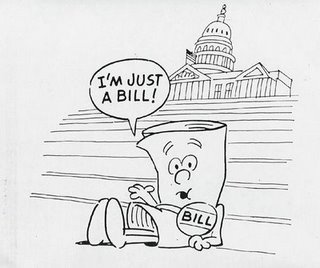Media
Severance Tax Legislation: The Process Stinks Too
 The Pennsylvania House amended legislation to impose a severance tax on natural gas last night, and will likely vote on the bill tonight. We wrote yesterday about the merits of the severance tax proposal itself and the tax rate, but watching the debate unfold on PCN-TV reveals how broken our process is.
The Pennsylvania House amended legislation to impose a severance tax on natural gas last night, and will likely vote on the bill tonight. We wrote yesterday about the merits of the severance tax proposal itself and the tax rate, but watching the debate unfold on PCN-TV reveals how broken our process is.
1) The bill is likely unconstitutional. Several lawmakers have echoed this concern. Even if the bill passes it may be struck down. The Pennsylvania Constitution says that, “All bills for raising revenue shall originate in the House.” SB 1155, as the name indicates, originated in the Senate.
The Constitution also states that no bill shall be amended “so as to change its original purpose.” The original purpose of SB 1155 dealt with bonds for lost property by local government officials — nothing to do with new taxes. And the Constitution requires that bills must not “be passed containing more than one subject”; again local government bonds and a state severance tax are slightly different subjects.
2) The legislation must be “done now.” Far too many lawmakers remarked that the bill “isn’t perfect” — not liking the rate, or wanting more of a local share, or more for environmental funds — but said that it needs to be passed immediately. Why not take time to fix the bill? Here’s an idea: legislation should be introduced, sent to a committee to review and make changes, brought to the floor of the House where members can offer amendments, and all the specifics can be debated. You know, the process for how a bill becomes a law.
3) Lawmakers don’t understand it. Most frustrating was the debate over the proposed amendment — which would reduce the share of tax revenue to the General Fund, and increase the Environmental Stewardship Fund. The author of the amendment was asked, more than once, what would be the impact on the local share, and insisted it would increase because it would be 16% of “a larger pie”.
This is wrong, the local share remains 16% of the total, after the first $75 million is sent to the General Fund and job training programs. The chart below illustrates the impact of the amendment.
| SB 1155 Severance Tax Distribution (in thousand of dollars) | ||
| Original | Amended | |
| Estimated Total Revenue | $120,242 | $120,242 |
| General Fund ($70 mill each year) | $70,000 | $70,000 |
| Job Training ($5 million/year for 3 years) | $5,000 | $5,000 |
| Remaining Revenue | $45,242 | $45,242 |
| General Fund – 60%/40% | $27,145 | $18,097 |
| Environmental Stewardship – 12%/32% | $5,429 | $14,477 |
| Local Share – 16% | $7,239 | $7,239 |
| Conservation Districts – 2.4% | $1,086 | $1,086 |
| Hazardous Sites Cleanup – 1.6% | $724 | $724 |
| Game Commission – 1.6% | $724 | $724 |
| Fish & Boat Commission – 2.4%/1.4% | $1,086 | $633 |
| LIHEAP – 1.6% | $724 | $724 |
| Disaster Recovery – 1.6% | $724 | $724 |
| Dam Projects – 0.8% | $362 | $362 |
| Total General Fund | $97,145 | $88,097 |
| Percent to General Fund | 80.8% | 73.3% |
| Job Creation Tax Credit ($10 million/year) | -$10,000 | -$10,000 |
| Future Revenue Estimates | |||
| 2012-13 | 2013-14 | 2014-15 | 2015-16 |
| $326,113 | $408,776 | $495,809 | $587,544 |